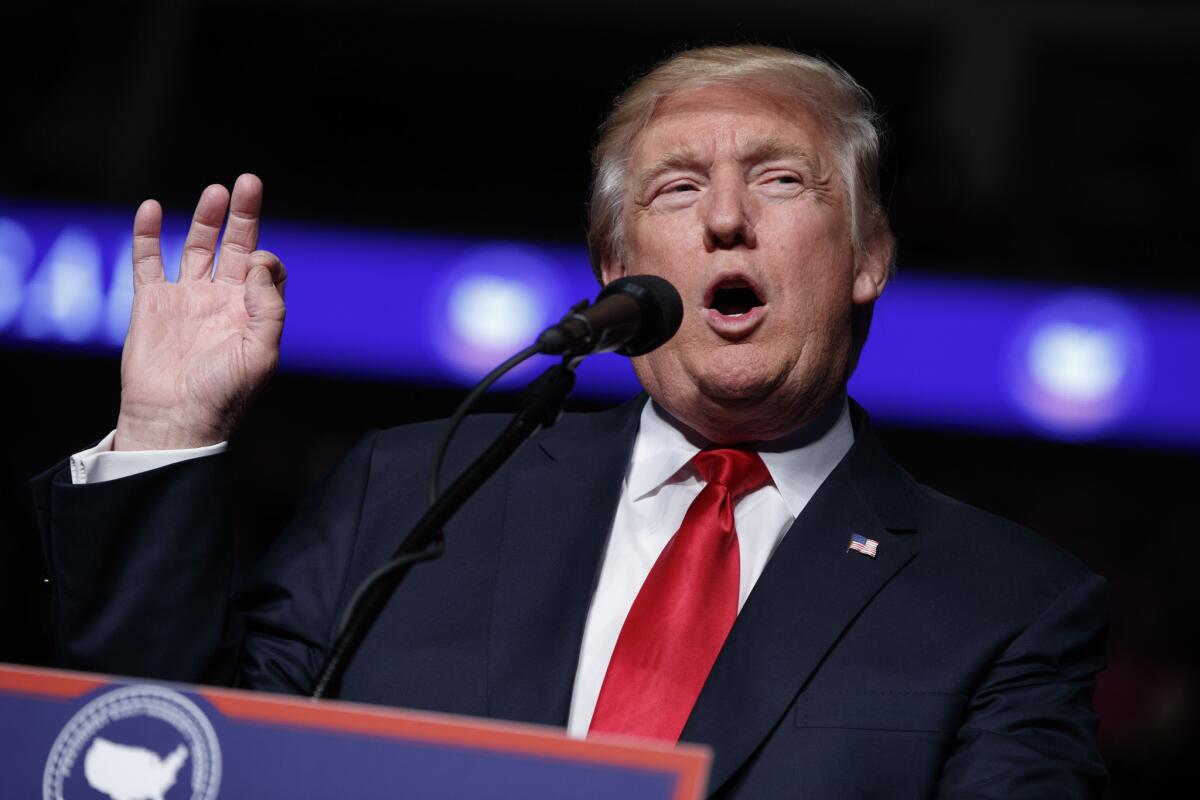Editorial: Trump hurts himself and the nation by trashing the intelligence community

It’s hardly news that Donald Trump can’t resist the temptation to take to Twitter to share his often ill-informed views. But the president-elect’s latest tweets about the intelligence community are especially outrageous.
As he prepared to be briefed on an investigation into alleged Russian hacking of Democratic emails, Trump posted this tweet on Tuesday evening: “The ‘Intelligence’ briefing on so-called ‘Russian hacking’ was delayed until Friday, perhaps more time needed to build a case. Very strange.”
It’s hard to know where to begin in criticizing this short missive. For one thing, it may be inaccurate: A U.S. official disputed that there had been any delay at all, saying that leading intelligence officials had from the start scheduled the briefing for Friday. Then there are the insulting scare quotes around the word “intelligence.” But the biggest concern of all is the implication that the evidence of Russian involvement is so frail that the briefers needed more time to gather (or concoct?) evidence. That is consistent with Trump’s previously expressed opinion that the hacking might have been carried out not by Russia but China or “somebody sitting in a bed someplace.”
It’s time for [Donald Trump] to sober up and take seriously both the issue of cyber-espionage and the high office he is about to occupy.
Then, on Wednesday morning, Trump tweeted this: “Julian Assange said ‘a 14 year old could have hacked [Hillary Clinton campaign chairman John] Podesta’ — why was DNC so careless? Also said Russians did not give him the info!” That was followed by yet another tweet in which Trump quoted Assange as saying U.S. media coverage was “very dishonest.” Trump added: “More dishonest than anyone knows.”
But why would Trump embrace Assange as an authority — before receiving a comprehensive briefing from U.S. intelligence officials?
Rep. Adam Schiff of Burbank, the ranking Democrat on the House Intelligence Committee, issued this statement Wednesday in response to Trump’s latest tweets: “With every conspiracy theory-laden tweet and erratic off-the-cuff comment, the president-elect does damage to our national security, while raising new concerns about his capacity to grow into the job. When he belittles the reputation of the brave and hard-working professionals in the intelligence community, he impairs our national security and the prospects for the success of his own administration.”
Schiff is right. The U.S. intelligence committee isn’t infallible, and any president has a responsibility to subject its conclusions to scrutiny. But that is not what Trump was doing in his tawdry tweet storm.
It’s possible, we suppose, that Trump has reached a disinterested conclusion that U.S. intelligence agencies aren’t to be trusted. His proposed national security adviser, retired Gen. Michael Flynn, a former director of the Defense Intelligence Agency, publicly has been critical of the Central Intelligence Agency. In a 2015 interview with the New York Times, Flynn suggested that the CIA had become “a very political organization.” Perhaps a similar view motivates Trump’s skepticism about the CIA’s conclusion that Russia interfered in the election to help him.
A far more plausible explanation is that Trump continues to view the question of Russian meddling through the prism of his own fragile ego.
As Trump sees it, if it’s established that the Russians meddled in the election to harm his opponent, some Americans will be confirmed in the view that Trump’s election was illegitimate. Last month Trump tweeted: “Can you imagine if the election results were the opposite and WE tried to play the Russia/CIA card. It would be called conspiracy theory!” For Trump, allegations that Russia interfered in the election were just a partisan “card” to be played by his political opponents.
We would like to think that, once he takes office, Trump will let loose of this defensiveness and reflexive suspicion of the intelligence community. The CIA and NSA and other agencies are, after all, powerful organizations created to help presidents govern — to provide them with facts and context and analysis to make educated decisions about world events.
But suppose he doesn’t? As Schiff noted in an interview with the Atlantic, Trump is undermining confidence in the intelligence community with each fight he picks — and someday, in a true national security crisis, he will find that the American people no longer believe them.
Throughout the campaign and since his election, Trump has shown a casual disregard for truth and facts. Perhaps, therefore, it shouldn’t be surprising that he has little interest in sophisticated analysis by experts on world affairs, that he has declined daily intelligence briefings from intelligence officials, that he relies instead on sources like Julian Assange and that he claims to have secret information unavailable to others.
But it’s time for him to sober up and take seriously both the issue of cyber-espionage and the high office he is about to occupy.
Follow the Opinion section on Twitter @latimesopinion and Facebook
More to Read
A cure for the common opinion
Get thought-provoking perspectives with our weekly newsletter.
You may occasionally receive promotional content from the Los Angeles Times.










